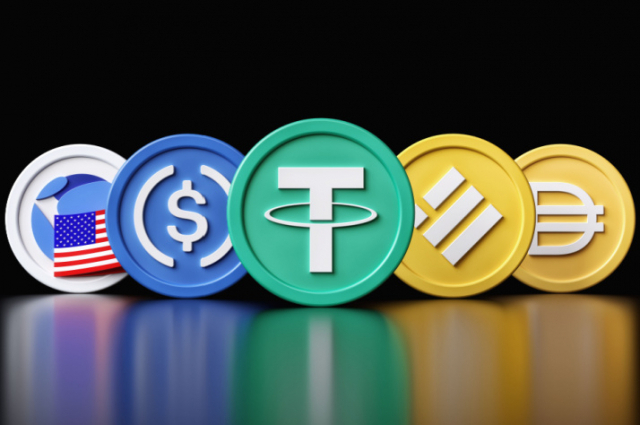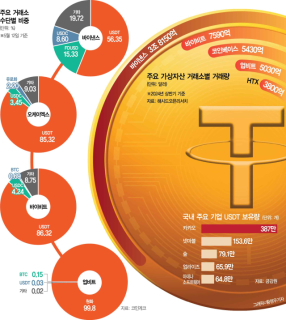
Kakao and SOOP, among other information technology (IT) and media companies, have been confirmed to hold approximately 8.2 million USDT. These were acquired as service compensation or during the introduction of Non-Fungible Tokens (NFT) in game businesses, indicating an increase in stablecoin usage in transactions between companies, not just individuals. The market suggests that while banks have begun working on issuing won-based stablecoins, there is still no basis for issuance, thus calling for urgent legal preparation.
On the 13th, according to a survey by Seoul Economic Newspaper targeting domestic external audit corporations, 17 companies in software, mobile games, and solution development sectors held approximately 8,185,336 USDT at the end of last year. In monetary terms, this amounts to about 9.62 billion won, approaching 10 billion won. When adding the largest domestic virtual asset exchanges like Dunamu (approximately 9.69 million) and Coinone (approximately 4.91 million), the number of USDT-holding companies and scale increases further.
The purposes of holding are diverse, from simple investment to service compensation and preparation for future business expansion. Kakao Investment currently holds 1.17 million USDT, while software companies Uprise and Adenasoft hold approximately 650,000 and 640,000 USDT respectively. Game companies like Krafton also hold a significant number of USDT.
Kim Min-seung, head of Korbit Research Center, explained that "Web 3.0 companies often acquire virtual assets, including USDT, for issuing their own virtual assets, business-related testing, and various cost processing."
Experts unanimously point out that while the penetration of stablecoins into the real economy is accelerating, domestic discussions are lagging. Overseas virtual asset exchanges already conduct 80-90% of their transactions using stablecoins. Kim Gyu-jin, CEO of Tiger Research, emphasized, "Won-based stablecoins can secure a niche market in trade or Korean wave content payments" and stressed the need for "clear regulatory frameworks and initial liquidity support."

While the stablecoin era is moving beyond personal payments to inter-corporate transactions, there are criticisms that domestic discussions on stablecoins are severely lacking. The rapid growth of global dominance of USDT and USDC is primarily due to major virtual asset exchanges adopting dollar stablecoins as the base currency for all transactions. Just as the dollar serves as the key currency in international financial transactions, dollar stablecoins are fulfilling this role in the virtual asset market.
According to CoinGecko's virtual asset data platform on the 12th, USDT accounts for 56.4% of transactions on the global top exchange Binance.
Other dollar stablecoins like First Digital USD (FDUSD) and USDC follow at 15.33% and 8.6% respectively. Dollar stablecoins account for approximately 80% of currency-wise transaction volumes.
The situation is similar in other global exchanges. OKX has USDT at 85.32% and USDC at 3.45%, with dollar stablecoins comprising 89% of total transaction volumes. Bybit shows USDT at 86.32% and USDC at 4.24%, exceeding 90%. In contrast, Korea's top exchange Upbit, while allowing USDT trading, only has a 0.03% transaction proportion, with over 99% conducted in Korean won. While domestic users trade virtual assets using won deposited in real-name accounts, global exchanges fundamentally trade virtual assets using USDT or USDC instead of legal tender. An industry insider explained that dollar stablecoins have gained a first-mover advantage by maintaining close cooperation with major exchanges from the market's early stages and being chosen by users based on stability and convenience.
The industry calls for issuing won-based stablecoins and making them the base currency for domestic exchanges in response to dollar stablecoins' penetration into payment and remittance in the real economy. Given that Upbit and Bithumb's transaction volumes match the world's largest exchanges, they could support the growth of won-based stablecoins. A Hashsed Open Research report showed that in the first quarter of last year, Korean won surpassed US dollars in global virtual asset transaction volumes. Excluding stablecoins, this pure legal tender comparison suggests significant investment amounts and activity when considering the economic scale difference between Korea and the US. Byeon Ju-woong, Populus Project Manager, stated, "Exchanges play a significant role in the initial adoption and growth of stablecoins, as seen with USDT" and predicted that if a won-based stablecoin is issued and adopted as the base currency by domestic exchanges, Korea's high trading activity could help strengthen its influence.
To achieve this, advice has been raised to restructure the current issuance and circulation system that only connects 'legal won → bank real-name account → exchange deposit/withdrawal'. Kim Yong-beom, former Financial Services Commission vice-chairman and Hashsed Open Research CEO, emphasized, "A structure has emerged where transactions can occur without banks and without directly passing through legal tender, functioning like digital currency within exchanges" and stressed the need to "bring won-based stablecoins into the system without dismantling bank-based regulations, allowing exchanges, issuers, and wallet operators to coexist."

- Reporter Shin Jung-seop
- jseop@sedaily.com
< Copyright ⓒ Decenter, reproduction and redistribution prohibited >







